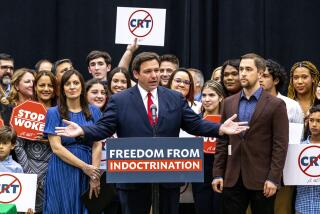U.S. Judge Charles E. Wiggins; Backed Nixon During Watergate
- Share via
Federal Appeals Judge Charles E. Wiggins, who was one of former President Richard Nixon’s staunchest defenders during the House Judiciary Committee’s Watergate impeachment inquiry, died Thursday night at his home in Las Vegas while watching the presidential debate, according to court officials.
The former Southern California congressman’s death was due to complications from diabetes and heart problems, said Cathy Catterson, chief clerk of the U.S. 9th Circuit Court of Appeals.
Wiggins, 72, was the senior judge of that court, to which he was appointed in 1984 by then-President Ronald Reagan.
“He was incredibly well respected among his colleagues,” Catterson said. “He was very soft-spoken, very gentle, thoughtful.”
Wiggins’ illness kept him from a full-time judicial schedule recently, although he sat on the bench for about half of the year, she said.
Among his rulings, Wiggins upheld the Defense Department’s “don’t ask, don’t tell” policy in a 1994 ruling in Holmes vs. California National Guard, finding that it did not violate the 1st or 5th Amendments.
In 1991 in United States vs. Restrepo, he ruled that prosecutors using uncharged crimes to increase a defendant’s sentence had only to meet the preponderance-of-evidence standard of proof.
His current cases will be reassigned to a replacement judge, drawn at random, including the case of the Exxon Valdez oil spill in Alaska, which netted a $5-billion judgment, Catterson said.
Wiggins was a loyal Nixon supporter, especially during the Watergate scandal, although the former president at first did not return the favor, refusing to campaign for Wiggins during his first congressional bid.
But after hearing the tape in which Nixon ordered the CIA to get the FBI to drop its investigation of the Watergate break-in, Wiggins in 1974 reluctantly concluded that Nixon, by resigning, “has done the right thing.”
“Such a conclusion was a sad and personally wrenching one for me to reach, because I regarded--and still do regard--myself as a friend of the president and his family and one still willing, proudly, to claim his achievements,” he wrote in a Los Angeles Times opinion piece. That sentiment never changed, and he expressed similar thoughts at a judicial symposium last month, Catterson said.
Wiggins was born in El Monte in 1927. His family had lived there since 1851, and his father was fire chief in the community. The Korean War veteran was student body president in grammar school and sophomore class president in high school. He lost two subsequent school election bids; a football player beat him for the student body presidency in Wiggins’ senior year, and he lost again in a race for student body president at Pasadena City College.
Those early losses seemed to whet his appetite for political races. In 1954, the USC law school graduate was appointed to the El Monte Planning Commission, officially launching his professional and political career.
In 1960, he was appointed to fill a vacancy on the City Council, and four years later, was elected mayor.
In 1966, he won a tough congressional race against a seemingly strong incumbent in a district where Democrats outnumbered Republicans by more than 40,000 voters.
That victory gained him Nixon’s unwavering support and a seat on the House Judiciary Committee, which Wiggins coveted.
He represented eastern Los Angeles and northern Orange counties for six terms. Wiggins also was a member of a commission that favored the breakup of the Court of Appeals in the 5th and 9th circuits, Catterson said. The former did break up, but Wiggins changed his views about the latter when he became a judge, she added.
Wiggins also was an avid fan of his alma mater’s sports teams and enjoyed watching USC play, Catterson said.
He is survived by his wife, Betty J. Koontz, and five children: Steven Wiggins, Gary Burnett, Darla Colton, Craig Burnett and Scott Wiggins.
His funeral is tentatively set for 11 a.m. Monday at the Palm Mortuary and Cemetery in Las Vegas.
More to Read
Sign up for Essential California
The most important California stories and recommendations in your inbox every morning.
You may occasionally receive promotional content from the Los Angeles Times.










